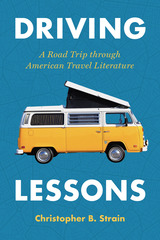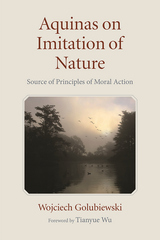

Bioethics and the Human Goods offers students and general readers a brief introduction to bioethics from a “natural law” philosophical perspective. This perspective, which traces its origins to classical antiquity, has profoundly shaped Western ethics and law and is enjoying an exciting renaissance. While compatible with much in the ethical thought of the great religions, it is grounded in reason, not religion. In contrast to the currently dominant bioethical theories of utilitarianism and principlism, the natural law approach offers an understanding of human flourishing grounded in basic human goods, including life, health, friendship, and knowledge, and in the wrongness of intentionally turning against, or neglecting, these goods.
The book is divided into two sections: Foundations and Issues. Foundations sketches a natural law understanding of the important ethical principles of autonomy, non-maleficence, beneficence, and justice and explores different understandings of “personhood” and whether human embryos are persons. Issues applies a natural law perspective to some of the most controversial debates in contemporary bioethics at the beginning and end of life: research on human embryos, abortion, infanticide, euthanasia, the withdrawal of tube-feeding from patients in a “persistent vegetative state,” and the definition of death. The text is completed by appendices featuring personal statements by Alfonso Gómez-Lobo on the status of the human embryo and on the definition and determination of death.
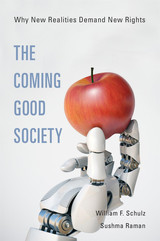
Two authors with decades of experience promoting human rights argue that, as the world changes around us, rights hardly imaginable today will come into being.
A rights revolution is under way. Today the range of nonhuman entities thought to deserve rights is exploding—not just animals but ecosystems and even robots. Changes in norms and circumstances require the expansion of rights: What new rights, for example, are needed if we understand gender to be nonbinary? Does living in a corrupt state violate our rights? And emerging technologies demand that we think about old rights in new ways: When biotechnology is used to change genetic code, whose rights might be violated? What rights, if any, protect our privacy from the intrusions of sophisticated surveillance techniques?
Drawing on their vast experience as human rights advocates, William Schulz and Sushma Raman challenge us to think hard about how rights evolve with changing circumstances, and what rights will look like ten, twenty, or fifty years from now. Against those who hold that rights are static and immutable, Schulz and Raman argue that rights must adapt to new realities or risk being consigned to irrelevance. To preserve and promote the good society—one that protects its members’ dignity and fosters an environment in which people will want to live—we must at times rethink the meanings of familiar rights and consider the introduction of entirely new rights.
Now is one of those times. The Coming Good Society details the many frontiers of rights today and the debates surrounding them. Schulz and Raman equip us with the tools to engage the present and future of rights so that we understand their importance and know where we stand.
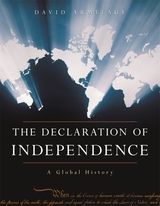
In a stunningly original look at the American Declaration of Independence, David Armitage reveals the document in a new light: through the eyes of the rest of the world. Not only did the Declaration announce the entry of the United States onto the world stage, it became the model for other countries to follow.
Armitage examines the Declaration as a political, legal, and intellectual document, and is the first to treat it entirely within a broad international framework. He shows how the Declaration arose within a global moment in the late eighteenth century similar to our own. He uses over one hundred declarations of independence written since 1776 to show the influence and role the U.S. Declaration has played in creating a world of states out of a world of empires. He discusses why the framers’ language of natural rights did not resonate in Britain, how the document was interpreted in the rest of the world, whether the Declaration established a new nation or a collection of states, and where and how the Declaration has had an overt influence on independence movements—from Haiti to Vietnam, and from Venezuela to Rhodesia.
Included is the text of the U.S. Declaration of Independence and sample declarations from around the world. An eye-opening list of declarations of independence since 1776 is compiled here for the first time. This unique global perspective demonstrates the singular role of the United States document as a founding statement of our modern world.
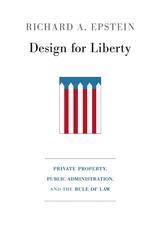
Following a vast expansion in the twentieth century, government is beginning to creak at the joints under its enormous weight. The signs are clear: a bloated civil service, low approval ratings for Congress and the President, increasing federal-state conflict, rampant distrust of politicians and government officials, record state deficits, and major unrest among public employees.
In this compact, clearly written book, the noted legal scholar Richard Epstein advocates a much smaller federal government, arguing that our over-regulated state allows too much discretion on the part of regulators, which results in arbitrary, unfair decisions, rent-seeking, and other abuses. Epstein bases his classical liberalism on the twin pillars of the rule of law and of private contracts and property rights—an overarching structure that allows private property to keep its form regardless of changes in population, tastes, technology, and wealth. This structure also makes possible a restrained public administration to implement limited objectives. Government continues to play a key role as night-watchman, but with the added flexibility in revenues and expenditures to attend to national defense and infrastructure formation.
Although no legal system can eliminate the need for discretion in the management of both private and public affairs, predictable laws can cabin the zone of discretion and permit arbitrary decisions to be challenged. Joining a set of strong property rights with sound but limited public administration could strengthen the rule of law, with its virtues of neutrality, generality, clarity, consistency, and forward-lookingness, and reverse the contempt and cynicism that have overcome us.

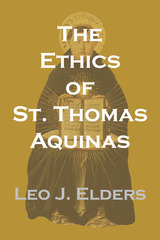

Heated debates over such issues as abortion, contraception, ordination, and Church hierarchy suggest that feminist and natural law ethics are diametrically opposed. Cristina L.H. Traina now reexamines both Roman Catholic natural law tradition and Anglo-American feminist ethics and reconciles the two positions by showing how some of their aims and assumptions complement one another.
After carefully scrutinizing Aquinas’s moral theology, she analyzes trends in both contemporary feminist ethics, theological as well as secular, and twentieth-century Roman Catholic moral theology. Although feminist ethics reject many of the methods and conclusions of the scholastic and revisionist natural law schools, Traina shows that a truly Thomistic natural law ethic nonetheless provides a much-needed holistic foundation for contemporary feminist ethics. On the other hand, she offers new perspectives on the writings of Josef Fuchs, Richard McCormick, and Gustavo Gutierrez, arguing that their failure to catch the full spirit of Thomas’s moral vision is due to inadequate attention to feminist critical methods.
This highly original book proposes an innovative union of two supposedly antagonistic schools of thought, a new feminist natural law that would yield more comprehensive moral analysis than either existing tradition alone. This is a provocative book not only for students of moral theology but also for feminists who may object to the very notion of natural law ethics, suggesting how each might find insight in an unlikely place.
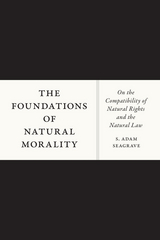
With The Foundations of Natural Morality, S. Adam Seagrave addresses this controversy, offering an entirely new account of natural morality that compellingly unites the concepts of natural law and natural rights. Seagrave agrees with Strauss that the idea of natural rights is distinctly modern and does not derive from traditional natural law. Despite their historical distinctness, however, he argues that the two ideas are profoundly compatible and that the thought of John Locke and Thomas Aquinas provides the key to reconciling the two sides of this long-standing debate. In doing so, he lays out a coherent concept of natural morality that brings together thinkers from Plato and Aristotle to Hobbes and Locke, revealing the insights contained within these disparate accounts as well as their incompleteness when considered in isolation. Finally, he turns to an examination of contemporary issues, including health care, same-sex marriage, and the death penalty, showing how this new account of morality can open up a more fruitful debate.
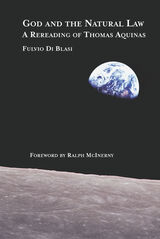
Blasi begins with an original analysis of the current debate in ethics, jurisprudence, and politics in order to set the stage for a sound understanding of the concept of natural law. This leads to the heart of the book: a recovery of the authentic meaning of the two main concepts of classical natural-law theory as synthesized by Thomas Aquinas – the will of God and the order of nature.
The wide revival of practical philosophy and ethics of objective-values in recent decades has involved a robust rediscovery of classical natural-law theory. This rediscovery is marked by two main traits: an emphasis on the autonomy of practical reason (as a reaction to modern voluntarism centered on the external will of the legislator); and an emphasis on the originality of practical reason (as a reaction to the idea of a rational deduction of
moral truths from the facts of nature). Without denying an autonomous character to ethics, or the need for a strong critique of moral rationalism, Di Blasi argues that Aquinas’s thought remains unintelligible if we remove from it either God or the metaphysical understanding of
nature.
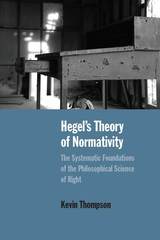

Appointed by Pope John XXIII to the Pontifical Commission on Population, Family, and Birth, Fuchs ultimately found himself disappointed in his three years of service and spent the next thirty years exploring a broad array of issues pivotal to a reconstruction of Roman Catholic natural law theory. This is the first full-length analysis of Fuchs's efforts.
Beginning historically by looking at Fuchs's writings and beliefs before the Pontifical Commission appointment, including his defense of natural law during the "situation ethics" debates of the 50s and 60s, the concept of personal salvation, and the status of "nature" and "human nature," Graham moves to the intellectual conversion that inspired Fuchs to reconsider his concepts following the commission appointment. From there, Graham engages in a sustained critique of Fuchs's natural theory, addressing both the strengths and weaknesses to be found there and suggest possible avenues of development that would make a positive contribution to the ongoing quest to rehabilitate the Roman Catholic natural law theory that continues to dominate the landscape of moral theology today.
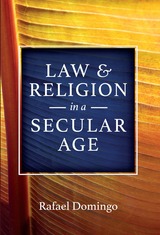
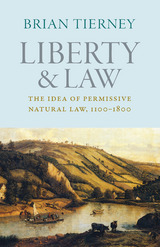

A concise and accessible introduction to natural law ethics, this book introduces readers to the mainstream tradition of Western moral philosophy. Building on philosophers from Plato through Aquinas to John Finnis, Alfonso Gómez-Lobo links morality to the protection of basic human goods — life, family, friendship, work and play, the experience of beauty, knowledge, and integrity — elements essential to a flourishing, happy human life.
Gómez-Lobo begins with a discussion of Plato's Crito as an introduction to the practice of moral philosophy, showing that it requires that its participants treat each other as equals and offer rational arguments to persuade each other. He then puts forth a general principle for practical rationality: one should pursue what is good and avoid what is bad. The human goods form the basis for moral norms that provide a standard by which actions can be evaluated: do they support or harm the human goods? He argues that moral norms should be understood as a system of rules whose rationale is the protection and enhancement of human goods. A moral norm that does not enjoin the preservation or enhancement of a specific good is unjustifiable. Shifting to a case study approach, Gómez-Lobo applies these principles to a discussion of abortion and euthanasia. The book ends with a brief treatment of rival positions, including utilitarianism and libertarianism, and of conscience as our ultimate moral guide.
Written as an introductory text for students of ethics and natural law, Morality and the Human Goods makes arguments consistent with Catholic teaching but is not based on theological considerations. The work falls squarely within the field of philosophical ethics and will be of interest to readers of any background.

Rooted in Western classical and medieval philosophies, the natural law movement of the last few decades seeks to rediscover fundamental moral truths. In this book, prominent thinkers demonstrate how natural law can be used to resolve a wide range of complex social, political, and constitutional issues by addressing controversial subjects that include the family, taxation, war, racial discrimination, medical technology, and sexuality.
This volume will be of value to those working in philosophy, political science, and legal theory, as well as to policy analysts, legislators, and judges.
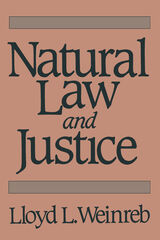
“Human beings are a part of nature and apart from it.” The argument of Natural Law and Justice is that the philosophy of natural law and contemporary theories about the nature of justice are both efforts to make sense of the fundamental paradox of human experience: individual freedom and responsibility in a causally determined universe.
Lloyd Weinreb restores the original understanding of natural law as a philosophy about the place of humankind in nature. He traces the natural law tradition from its origins in Greek speculation through its classic Christian statement by Thomas Aquinas. He goes on to show how the social contract theorists adapted the idea of natural law to provide for political obligation in civil society and how the idea was transformed in Kant’s account of human freedom. He brings the historical narrative down to the present with a discussion of the contemporary debate between natural law and legal positivism, including particularly the natural law theories of Finnis, Richards, and Dworkin.
Weinreb then adopts the approach of modern political philosophy to develop the idea of justice as a union of the distinct ideas of desert and entitlement. He shows liberty and equality to be the political analogues of desert and entitlement and both pairs to be the normative equivalents of freedom and cause. In this part of the book, Weinreb considers the theories of justice of Rawls and Nozick as well as the communitarian theory of Maclntyre and Sandel.
The conclusion brings the debates about natural law and justice together, as parallel efforts to understand the human condition. This original contribution to legal philosophy will be especially appreciated by scholars, teachers, and students in the fields of political philosophy, legal philosophy, and the law generally.

"Public reason" is one of the central concepts in modern liberal political theory. As articulated by John Rawls, it presents a way to overcome the difficulties created by intractable differences among citizens' religious and moral beliefs by strictly confining the place of such convictions in the public sphere.
Identifying this conception as a key point of conflict, this book presents a debate among contemporary natural law and liberal political theorists on the definition and validity of the idea of public reason. Its distinguished contributors examine the consequences of interpreting public reason more broadly as "right reason," according to natural law theory, versus understanding it in the narrower sense in which Rawls intended. They test public reason by examining its implications for current issues, confronting the questions of abortion and slavery and matters relating to citizenship.
This energetic exchange advances our understanding of both Rawls's contribution to political philosophy and the lasting relevance of natural law. It provides new insights into crucial issues facing society today as it points to new ways of thinking about political theory and practice.
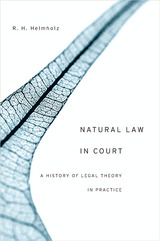
The theory of natural law grounds human laws in the universal truths of God’s creation. Until very recently, lawyers in the Western tradition studied natural law as part of their training, and the task of the judicial system was to put its tenets into concrete form, building an edifice of positive law on natural law’s foundations. Although much has been written about natural law in theory, surprisingly little has been said about how it has shaped legal practice. Natural Law in Court asks how lawyers and judges made and interpreted natural law arguments in England, Europe, and the United States, from the beginning of the sixteenth century to the American Civil War.
R. H. Helmholz sees a remarkable consistency in how English, Continental, and early American jurisprudence understood and applied natural law in cases ranging from family law and inheritance to criminal and commercial law. Despite differences in their judicial systems, natural law was treated across the board as the source of positive law, not its rival. The idea that no person should be condemned without a day in court, or that penalties should be proportional to the crime committed, or that self-preservation confers the right to protect oneself against attacks are valuable legal rules that originate in natural law. From a historical perspective, Helmholz concludes, natural law has advanced the cause of justice.
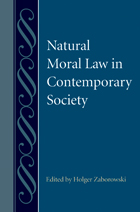
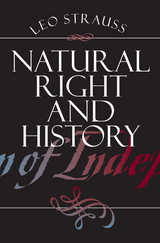
"Strauss . . . makes a significant contribution towards an understanding of the intellectual crisis in which we find ourselves . . . [and] brings to his task an admirable scholarship and a brilliant, incisive mind."—John H. Hallowell, American Political Science Review
Leo Strauss (1899-1973) was the Robert Maynard Hutchins Distinguished Service Professor Emeritus in Political Science at the University of Chicago.
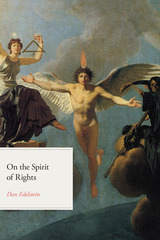
In On the Spirit of Rights, Dan Edelstein answers this question by examining the complex genealogy of the rights that regimes enshrined in the American and French Revolutions. With a lively attention to detail, he surveys a sprawling series of debates among rulers, jurists, philosophers, political reformers, writers, and others who were all engaged in laying the groundwork for our contemporary systems of constitutional governance. Every seemingly new claim about rights turns out to be a variation on a theme, as late medieval notions were subtly repeated and refined to yield the talk of “rights” we recognize today. From the Wars of Religion to the French Declaration of the Rights of Man and of the Citizen to the 1948 Universal Declaration of Human Rights, On the Spirit of Rights is a sweeping tour through centuries of European intellectual history and an essential guide to our ways of thinking about human rights today.
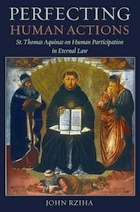
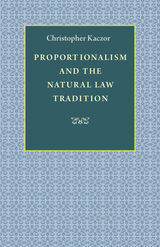

As members of various and often conflicting communities, how do we reconcile what we have come to understand as our human rights with our responsibilities toward one another? With the bright thread of individualism woven through the American psyche, where can our sense of duty toward others be found? What has happened to our love—even our concern—for our neighbor?
In this revised edition of his magisterial exploration of these critical questions, renowned ethicist Arthur Dyck revisits and profoundly hones his call for the moral bonds of community. In all areas of contemporary life, be it in business, politics, health care, religion—and even in family relationships—the "right" of individuals to consider themselves first has taken precedence over our responsibilities toward others. Dyck contends that we must recast the language of rights to take into account our once natural obligations to all the communities of which we are a part.
Rethinking Rights and Responsibilities, at the nexus of ethics, political theory, public policy, and law, traces how the peculiarly American formulations of the rights of the individual have assaulted our connections with, and responsibilities for, those around us. Dyck critically examines contemporary society and the relationship between responsibilities and rights, particularly as they are expressed in medicine and health care, to maintain that while indeed rights and responsibilities form the moral bonds of community, we must begin with the rudimentary task of taking better care of one another.
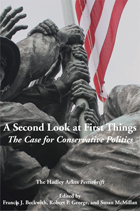
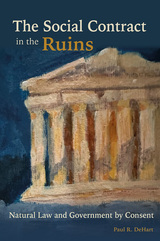
Most scholars who write on social contract and classical natural law perceive an irreconcilable tension between them. Social contract theory is widely considered the political-theoretic concomitant of modern philosophy. Against the regnant view, The Social Contract in the Ruins, argues that all attempts to ground political authority and obligation in agreement alone are logically self-defeating. Political authority and obligation require an antecedent moral ground. But this moral ground cannot be constructed by human agreement or created by sheer will—human or divine. All accounts of morality as constructed or made collapse into self-referential incoherence. Only an uncreated, real good can coherently ground political authority and obligation or the proposition that rightful government depends on the consent of the governed. Government by consent requires classical natural law for its very coherence.
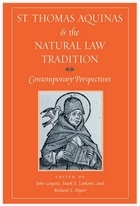
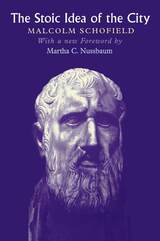
"The account emerges from a jigsaw-puzzle of items from a wide range of authorities, painstakingly pieced together and then annotated in a series of appendixes, the whole executed with fine scholarship, clarity, and good humor."—Times Literary Supplement
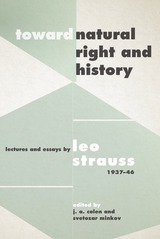
Previously unpublished in book form, Strauss’s lectures are presented here in a thematic order that mirrors Natural Right and History and with interpretive essays by J. A. Colen, Christopher Lynch, Svetozar Minkov, Daniel Tanguay, Nathan Tarcov, and Michael Zuckert that establish their relation to the work. Rounding out the book are copious annotations and notes to facilitate further study.
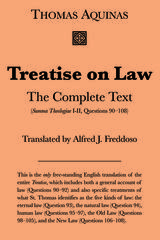
St. Thomas’s account of law is firmly embedded within a general moral theory that begins with a rich conception of human flourishing, i.e., the good for human beings (Questions 1–5). This good consists, first and foremost, in our ultimate and intimate union with the Persons of the Blessed Trinity – a union that in our present state we can grasp intellectively and pursue affectively only with God’s supernatural assistance. It is within this framework that we order our loves and pursue the more proximate goals they open up to us as human beings in this life. Given the appropriate goals, the next question is how we can get from where we are, in the grips of the consequences of Original Sin, to where we want to be. The answer is: by means of (a) human actions that are good, i.e., rightly ordered toward our ultimate end and (b) the habits that these actions either engender or flow from. In analyzing human actions (Questions 6–21) and their relation to the passions (Questions 22–48), St. Thomas gives a general account of what he calls the ‘intrinsic principles’ of human actions and their associated habits – both virtues (Questions 49–70) and vices (Questions 71–89). It is only then that he turns to what he calls the ‘extrinsic principles’ of good human actions, viz., law (Questions 90–108) and grace (Questions 109–114).
According to St. Thomas, law, far from supplanting virtue as a basic principle of action, serves as an independent principle of action that complements virtue and is itself capable of being factored into practical deliberation. The reason is that all of God’s
precepts, prohibitions, and punishments are aimed at promoting the good of the whole universe and, more particularly, the good for human beings, both individually and within the various forms of social life. Because of this, law serves as both a restraint on bad actions and a spur to good action, i.e., a restraint on actions that take us away from virtue and genuine human flourishing and a spur to actions that promote virtue and flourishing.
There are many benefits of having the whole treatise rather than just the first few questions, as has been the standard practice in previous editions of the Treatise on Law. To mention just a few of these benefits, the question on the moral precepts of the Old Law (question 100) helps to illuminate in many different ways the earlier questions on natural law and human law (questions 94–97). Again, the questions on the ceremonial and judicial precepts of the Old Law (questions 101–105) demon-strate in depth the symbiotic relationship that St. Thomas takes to obtain between the Old Testament and the New Testament. The questions on the New Law provide an introduction to the Christian way of life that will be described in incomparable detail in the Second Part of the Second Part, the bulk of which is structured around the treatment of the three theological virtues and the four cardinal virtues.
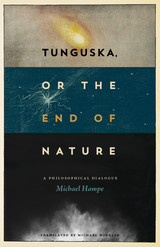
Tunguska, Or the End of Nature uses its four-man setup to tackle some of today’s burning issues—such as climate change, environmental destruction, and resource management—from a diverse range of perspectives. With a kind of foreboding, it asks what the world was like, and will be like, without us, whether we are negligible and the universe random, whether nature can truly be explained, whether it is good or evil, or whether nature is simply a thought we think. This is a profoundly unique work, a thrillingly interdisciplinary piece of scholarly literature that probes the mysteries of nature and humans alike.
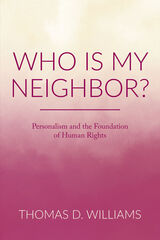
READERS
Browse our collection.
PUBLISHERS
See BiblioVault's publisher services.
STUDENT SERVICES
Files for college accessibility offices.
UChicago Accessibility Resources
home | accessibility | search | about | contact us
BiblioVault ® 2001 - 2025
The University of Chicago Press






